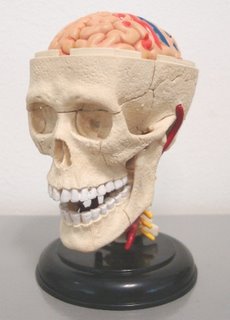 Bruce Alberts, who is the Professor of Biochemistry and Biophysics at University of California San Francisco, gave a talk at the Biopolis yesterday.
Bruce Alberts, who is the Professor of Biochemistry and Biophysics at University of California San Francisco, gave a talk at the Biopolis yesterday.Prof. Alberts served two terms as the President of the National Academy of Sciences from 1993-2005, and is one of the original authors of the "Molecular Biology of the Cell" textbook (affectionately called the "Alberts" textbook by undergrads). He has been the editor-in-chief of Science magazine since 1st March 2008.

He was also the PhD supervisor of one of the top science bloggers, Larry Moran.

His talk is entitled "Biology past and biology future: where have we been and where are we going?"
He began by commenting that the situation in the USA is a bit crazy now, and hoped that things are more rational here in Singapore.
Then he presented an outline of his talk, which is divided into three parts: a review of his personal history, a discussion about the central role of protein machines, and his experiences on textbook writing and how they relate to new challenges for the biological scientist.
Here are some of the highlights in his talk!
1. Prof. Alberts mentioned that he was a high school student when the famous Watson and Crick DNA model appeared in 1953.
The next breakthrough, which he felt was also very important, was the discovery of DNA polymerase by Arthur Kornberg in 1957, who was later awarded the Nobel prize for his work.
Later, for his PhD thesis, Prof. Alberts decided to investigate if DNA polymerase alone can replicate DNA.

The result - it didn't work!
Consequently, he was the only student in his batch at Harvard to fail his PhD exam and had to retake it again.
This unpleasant experience was a wake-up call for him and this failure taught him two important lessons - that theoretical biology was more difficult than expected, and that having a good research strategy is the key to success in science. He cautioned against approaches with a "yes or no" answer; instead he recommended planning experiments where any answer will help advance scientific understanding by at least a small amount.
He also emphasized the importance of learning from failure, and that young people should be allowed to fail. He stressed this point a few times during the talk.
2. Next, he discussed some molecular details of the DNA replication process. Prof. Alberts felt that DNA polymerase is an amazing enzyme and presented videos illustrating the replication process.
Here is one of the videos:
DNA replication involves at least 7 proteins (7 in phages, 13 in bacteria and 27 in human beings), which is the reason why Prof. Alberts' initial experiments failed.
After his PhD, he worked out a new strategy and invented a technique for isolating the proteins required for DNA replication. Using his new method, he discovered the first single-stranded DNA binding protein in 1970.
He then went over some details of other protein machines that are powered by ATP hydrolysis.
He emphasized the importance of biochemical approaches such as activity assays, which is not commonly done in genomics labs.
3. After that, he talked about some insights he learnt while writing the textbook. He put up a photo of the manuscript, showing numerous corrections by the different authors to illustrate how messy the process was.
He revealed that one of the co-authors, James Watson, had grossly underestimated the time required to write the book, thinking that it can be done over the summer. Eventually it took more than a year, working 16-hour days, in order to finish the textbook.
While revising the textbook in recent years, Prof. Alberts observed some surprises in the research literature: that there are many functional DNA sequences that do not encode for proteins, that positive and negative feedback loops underlie nearly all of cell chemistry, and that extensive scaffold networks produce sub-compartments inside a cell without requiring a membrane.
He pointed out that there are about 35,000 highly conserved non-coding DNA sequences in the human genome with an average length of around 200 base pairs each. The biological activities of most of them are not yet known. He felt that more biochemists are needed to help study these.
Talking about the feedback loops, he noted that there is no way to understand these without mathematics, and thus physicists and computer scientists are needed to help study these. He emphasized the importance of starting with simple model systems, such as yeast.
As for intracellular compartmentalization without membranes, he highlighted the examples of the nucleolus and Cajal body. Current research suggest that cellular components such as these are transported to specific locations within the cell via "positional codes", and Prof. Alberts noted that this is markedly different from the previous concept of proteins randomly interacting with each other back in the 1960s.
Then, he discussed three important roles of biology: to inspire, to design intelligent strategies for improving human health, and to investigate the origin of life (what we can learn from Mars!).
To underscore the role of science for inspiration, he highlighted this quote from Richard Feynman:
The world looks so different after learning science. For example, trees are made of air, primarily. When they are burned, they go back to air, and in the flaming heat is released the flaming heat of the sun which was bound in to convert the air into tree, and in the ash is the small remnant of the part which did not come from air that came from the solid earth, instead.
These are beautiful things, and the content of science is wonderfully full of them. They are very inspiring, and they can be used to inspire others.
To sum up, Prof. Alberts observed that biology in the past 50 years has made successful inroads into understanding the molecular basis of life, but we still need to decipher the pathways involved.
In the future, the focus will shift towards "emergent properties" - properties that stem from complicated networks of chemical interactions, where understanding each individual part cannot illuminate the overall process. New methods and approaches will be needed before we can claim to understand even the simplest cells.
He stressed that there are many challenges for young scientists and encouraged them to "be ambitious!"
4. Then, it was time for the Q&A session.
The first question from the audience was about the difficulty of learning anything robust in biology, due to the complexity of the systems involved.
Prof. Alberts recommended that it is crucial to plan a model system, especially simple organisms such as phages and E. coli, and to focus on one subsystem of a problem. More focus would be helpful.
The second question was a discussion about the risk adverse climate in scientific research. Prof. Alberts noted that in the USA, scientists tend to submit grant proposals that will work - that is, they avoid risky projects. Science has become too conservative, and he thought that people should be given a chance to fail. "Good failures" should be rewarded.
He felt that the current method of evaluating a scientist by the number of published papers is having a negative effect, but acknowledged that top journals such as Nature and Science are "part of the problem". Science magazine alone receives over 12,000 submissions per year, so it is very difficult to select papers for publication.
Next, Prof. Alberts expressed his concerns over the continued fragmentation of biology. He wondered if there could be a "Department of Nucleolus" in the future and if biology textbooks 50 years from now would still be readable.
One member of the audience then asked: "How do you think that science education can be improved?"
Prof. Alberts said that he wasn't familiar with the Singapore system, but he felt that the "No child left behind" policy in the USA is having damaging effects. He observed that in politics, one has to be "right" - education policies are very dogmatic in the US and will benefit from more research on the education system itself.
To illustrate this, he said that his grandson is currently studying a science course at grade school and had to memorize parts of a flower. When Prof. Alberts asked him if he had actually seen the flower, he said no. Not surprisingly, his grandson hated that course - he preferred a course in ceramics instead, where he can create something by himself.
He felt that they were doing a horrible disservice to young people by making science a chore, and emphasized that "memorizing words is not science".
The last question was about the role of physicists, computer scientists and engineers in biology. Prof. Alberts reminded the biologists in the audience to keep their colleagues informed, and that it is not trivial to explain what is important and what isn't to the non-biologists who are part of the research team.
5. Before he left the room, Fresh Brainz managed to ask Prof. Alberts two questions relevant to the science' o sphere:
a) Do you see an important role for the Internet as a tool for science communication and education?
He felt that the Internet has been revolutionary for many aspects of society, but at present it is not very effectively used for science education. He revealed that the upcoming 2nd January 2009 issue of Science will contain a special feature on this topic.
b) Would you encourage more professors to write blogs?
He said that "some of them" should and agreed that Prof. Larry Moran writes really well.
Would you like to know more?
- BMRC Distinguished Visitor Programme






2 Comments:
Haha nice summary you've got there. I wonder who he is referring to when he says SOME should.
To Ed:
I think what he means is that professors have more important obligations than blogging.
Post a Comment